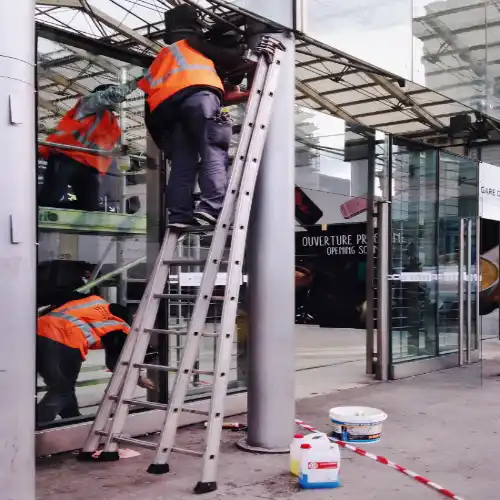OSHA’s #3 Most Cited Violation of 2025: Ladders (1926.1053)
Ladders rank #3 in OSHA’s Top 10 Violations for 2025, with 2,405 citations for damaged rungs, improper angles, and unsafe use. Learn why these violations persist and how Advanced Safety & Industrial Supply can help you select the right equipment, train your team, and maintain compliance with OSHA 1926.1053 ladder safety requirements.

Why Ladder Safety Still Tops the Charts — and How to Step Up Your Program
Ladders are simple tools—but consistently one of the most dangerous. In FY 2025, OSHA issued 2,405 citations for ladder violations under 1926.1053, placing it #3 in the Top 10. That’s 573 fewer than 2024, but thousands of injuries still occur every year from the same preventable mistakes.
For safety directors like Steve, purchasing agents like Alex, and plant managers like Pete, ladder safety isn’t about equipment shortages—it’s about training, inspection, and culture.
Where OSHA Finds Ladder Violations
1. Damaged or Unsafe Ladders
Cracked rails, missing rungs, corrosion, or bent rails immediately violate 1926.1053(b)(16). Ladders must be removed from service until repaired or replaced.
2. Incorrect Angle or Support
Portable ladders should be set at a 4:1 angle and extend 3 feet above the landing. Too steep or shallow placement is one of the most common field citations.
3. Using the Top Rung or Step
Standing on the top rung or step of a ladder that is not designed for it is explicitly prohibited. This violation continues to appear in nearly every inspection cycle.
4. Improper Use of Ladders
Workers use the wrong type for the task—extension ladders as scaffolds, metal ladders near electrical sources, or job-made ladders without proper construction standards.
5. Failure to Secure or Stabilize
Ladders must be secured to prevent movement and placed on stable surfaces. OSHA commonly cites employers for allowing ladder shift or slippage.
How to Stay Compliant With 1926.1053
✔ Inspect Before Every Use
Look for cracks, oil, bent rails, loose rungs, or corrosion. Tag and remove damaged ladders immediately.
✔ Train All Employees
Training must cover safe placement, angle, load ratings, and electrical precautions. Document sessions and refresher training.
✔ Use the Right Ladder for the Job
Step, extension, platform, or fiberglass—select based on task and environment.
✔ Maintain Three Points of Contact
Climb facing the ladder with two hands and one foot at all times. Never carry tools in hand while ascending.
✔ Secure and Stabilize
Tie off extension ladders and use stabilizers when working at height.
How Advanced Safety & Industrial Supply Can Help
Advanced Safety & Industrial Supply offers the products, training, and services you need to reduce ladder-related incidents:
✅ OSHA-compliant ladder safety training
✅ Worksite audits and inspection checklists
✅ ANSI-rated ladders and access equipment
✅ Fall protection gear and tie-off systems
✅ Mock OSHA inspections for construction sites
Let our team help your facility reduce citations, prevent accidents, and protect your workforce.
Call (615) 739-3278 or Contact Us now to schedule training or an onsite evaluation.
















